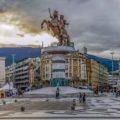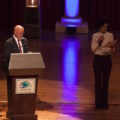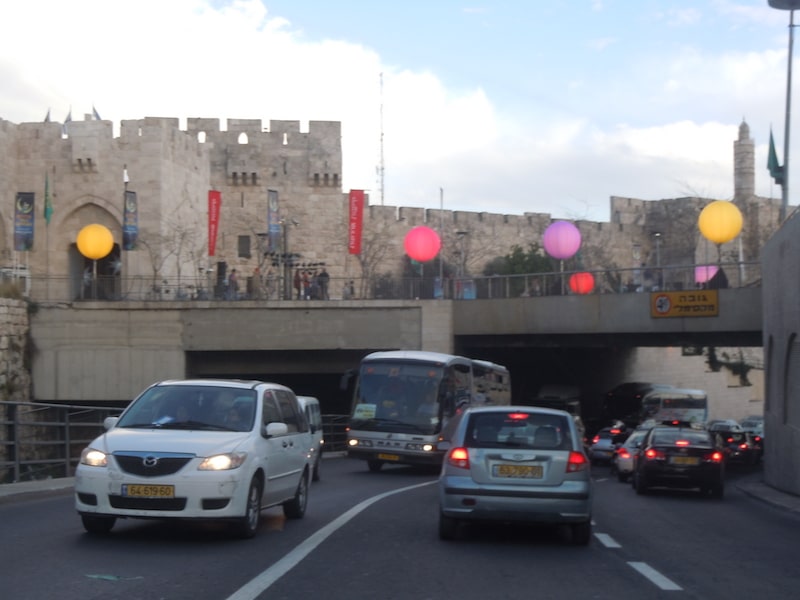
Claudiaexpat draws on her experience of three years in Palestine to give us some tips and infos about driving in Jerusalem.
If you come to live in Jerusalem, you might decide to get yourself a car. Buying a car is usually done here by word of mouth – expatriates are leaving and hence selling their cars all the time. People at your office (or your husband’s or wife’s) will know if there are good occasions. You can also look at websites like www.jerusalemexpatnetwork.org and https://www.janglo.net/ However, cars with white plates (i.e. «diplomatic plates») can only be purchased by people holding a diplomatic passport or diplomatic status. If this is not your case, you’ll buy a «yellow plate» car, which is absolutely fine although you won’t enjoy the benefits and the freedom of driving around with a white plate car. These generally include the fact that police usually do not bother diplomats, and therefore will close one eye if you park in the wrong spot (on the pavement, on red and white strips, on places reserved to residents) or if you ride on a yellow lane (reserved to public transportation and taxis).
This does not mean that the above mentioned is legal: white plates car are supposed to behave like anyone else, but tolerance about infractions from the above is a fact. If you, on the contrary, drive a common yellow plate car, you have to be very careful and dutifully comply to all rules, because police is everywhere, very inflexible, and fines are high. Most commonly fines are given for the following reasons:
- parking in the wrong spot (I’ll talk profusely about parking further on), from 100 to 500 NIS
- travelling without security belt, 250 NIS (per person not wearing it)
- talking on the mobile while traveling, 1,000 NIS
- traveling on a yellow lane, 250 NIS
- traveling with no lights (compulsory even during the day from October to April), 250 NIS
If you don’t want to waste money, I strongly suggest you to be careful.
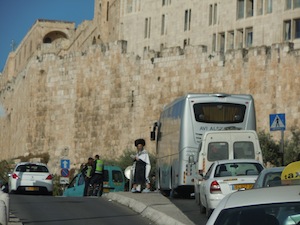 Driving in Jerusalem is not a relaxing affair. Although the town is relatively small and your movements will probably concentrate on repeated routes, many are the factors that might confuse you:
Driving in Jerusalem is not a relaxing affair. Although the town is relatively small and your movements will probably concentrate on repeated routes, many are the factors that might confuse you:
- «white» and «yellow» lanes have nothing to do with the color of the plates: as in many other countries white lanes are for everybody, yellow lanes are for public transport and taxis. What can happen, especially when you are new and don’t know your way around, is that you suddenly find yourself without choice but going on to a yellow lane. You’ll eventually get to know the way so well that this won’t be a problem for you any more, but at the beginning try to be careful;
- signs are usually in three languages, Hebrew, Arabic and English, and this might confuse you. Especially on the big avenues that bring you to the outskirts of Jerusalem, panels can often be more confusing than helpful, unless you know exactly where you are going and find out beforehand what areas and avenues will bring you at destination;
- people are generally pretty nervous when driving, and if you stop where you are not supposed to (to read a sign, for instance) or slow down and drive in an uncertain way, they start honking and that will probably make you nervous;
- traffic lights can also be confusing at the beginning: some crossings can have four or more options (go straight, go straight for yellow lanes, turn left, turn right) and the lights will go on at different times, so you have to be very concentrated to know when your turn arrives. Before turning green, lights show briefly the yellow light, this means that you can start on the gas (if you don’t the person behind you will probably start honking);
- it is common practice here not to respect the queue – you will always have someone that passes besides a long line (at a traffic light for instance) and sneaks in at the top of it. It is considered normal and widely accepted, but it can be tough to digest for people coming from foreign cultures. Know that if you insist not to let the car take her place at the top of the line, you might arise surprise (and anger, in some cases). Some drivers even get beside you and call you by honking to plainly ask you to let them sneak in;
- on the West side of town people rarely thank you if you let them pass.
Once you get used to the rules (legal and behavioral ones) you’ll find driving in Jerusalem totally acceptable and sometimes even enjoyable – relaxing at the wheel will give you the opportunity to look around and it’s not the variety of human types that Jerusalem lacks!
Be careful when you cross Jews ultra orthodox neighborhoods. Cars that are clearly marked with UN signs or bear other logos of international organizations are badly viewed, sometimes people might even throw stones at them (it often happened to a friend of mine that had a UN car and passed through Mea Sharim – the eldest ultraorthodox neighborhood in Jerusalem, and in a central position – to collect her daughter at the Anglican school). Mea Sharim has a very high concentration of prams, and pavements are usually very narrow, so you might want to be extra careful when driving through it, and go very slowly. Always dress with long sleeves when you enter the neighborhood.
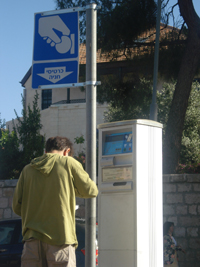 Parking deserves a chapter for itself: as we said above, unless you have a white plate car, you’ll have to learn where you can and cannot park. In the central areas of town, there are three kinds of stripes: red and yellow mean that the space is reserved for loading and unloading ; red and white means it is forbidden to park ; blue and white are paying parking spaces.
Parking deserves a chapter for itself: as we said above, unless you have a white plate car, you’ll have to learn where you can and cannot park. In the central areas of town, there are three kinds of stripes: red and yellow mean that the space is reserved for loading and unloading ; red and white means it is forbidden to park ; blue and white are paying parking spaces.
You can pay in a wide variety of ways:
- inserting coins into the parking meters (they accept 10, 5, 2, 1, 0,5 and 0,10 coins) up to a maximum of two hours (11.20 NIS)
- getting a parking ticket at the parking machines, they are usually located in convenient positions. They accept the same coins as the parking meters, and while you insert them, you’ll see until when you are allowed to stay in the parking place. Once you reach the desired time, press the green button: you’ll receive your ticket, that you’ll have to expose very clearly on the front of your car or (lots do so) on the driver’s window
- you can buy scratch cards (5.60 NIS per hour) but they are a bit more complicated because they are written in Hebrew, so you’ll have to ask the shopkeeper to show you how to scratch them. You won’t always find shops that sell them (usually stationary or drugstores), but you might want to buy a bunch and have them ready in your car, in case you don’t find parking meters of the parking machine is nowhere in sight (which is very rare anyway)
The best solution of all is to get an Easypark, a small parking device that you can buy at gas stations and post offices for 109 NIS and you can recharge conveniently in the same. Ask the person that sells it to you to set it for parking in Jerusalem (nr. 2). It’s very easy to use and it charges the official municipality parking fee (5,6 NIS per hour). You should put it in the driver’s window and not forget to turn it off once you get back to your car – which is almost impossible because it beeps constantly to let you know it’s on. You can set it for two hours parking maximum.
On the outskirts or in particular areas parking is not regulated and you can park everywhere, always taking care of the red and blue international sign that forbids parking. In some places you will be puzzled by threatening signs in Hebrew, they usually indicate parking only for residents or for special situations, like spaces reserved to ambulances. When in doubt, look for a parking place elsewhere. Jerusalem has lots of private parking spaces that are very expensive. They can cost up to 16 NIS per hour. In the East you have parking spaces where you pay a fixed amount for the whole day, one of this is conveniently located in front of the YMCA and the Legacy Hotel in Nablus Rd. You pay 20 NIS no matter how long you leave your car within the 24 hours.
Once you have bought your car (the procedure is easy and usually carried out by the seller, but you can ask us in case of need), you need an insurance. There is a compulsory insurance in Israel and the company will then propose you all the different packages to protect your car. Here are two insurance companies that I can recommend:
Tubiah
Keren Kayemet 23
Rehavia
Tel. 02 5661122
The owner speaks English
Harel Group
https://www.harel-group.com/
You can talk to Sabrina, she speaks English, tel 02 6244776 / 6255503
You pay an annual fee of about 900 NIS, but this sum is obviously indicative since the amount to pay will depend on your car’s model and age. Usually the company calls you once your insurance is about to expire. Very important: the insurance will not refund any money in case of an accident that was not your fault unless you have an Israeli driving permit.
Indeed, you are allowed to drive with your international or local driving licence for 6 month after your first arrival in Israel. Once the period is over, you have to get an Israeli permit. Depending on the kind of visa you have, you might have to pass the driving test. If you have a diplomatic or service visa, you don’t, and in this case, if the office you work for does not take care of the procedure, here is what you have to do:
- go to the Ministry of Transportation in the Kalal Building on Jaffa Road. Bring with you your driving permit (of the country you are from), your passport with valid visa and any Israeli ID you might have. They will check and photocopy the documents, and will give you a registration number;
- take an eyes test. Go to an optician that performs eye tests for the driving permit (one is Six/Six Shop at 23 Ben Yehuda Street) with your registration number and passport. They will issue a certificate after the test;
- go to the Licence Bureau in Pierre Street, Talpyot. Give them all the documents (registration number, eye doctor certificate, passport, id if you have one, driving permit) and two photos and they’ll issue a temporary driving paper, that you can use until your Israeli driving licence is issued (about two weeks later, and you’ll collect it at the same office in Pierre Street).
If you have another kind of visa, the procedure will be the same, but you’ll have to pass the test, and for this you have to go through a driving agency. You can call Ameer (tel. 052 2914512), that can take care of part of the procedure and facilitate the practical test, that you’ll undergo with an Israeli instructor, but on Ameer’s car, and after some lessons with him.
If you want to rent a car for the first days, you find rentals on King David Street (Sixt, Avis, Hertz) and more.
In the East, Good Luck Rent-a-car, right at the entrance of Sheik Jarrah, besides the Olive Tree Hotel, tel. 02 6277033, or Middle East Car Rental in Nablus Rd. tel. 02-6262777.
Gas station and gasoline
Gas stations are everywhere, both in the east and the west part of Jerusalem. You can ask the boy to fill up your tank, or do it yourself. In this case you’ll have to pop into the little shop and ask them to make the pump available (they’ll want to know how you are going to pay – cash or credit card – and how much gasoline you want to).
Mechanics
I can’t really help you much on this, I have one but I am not 100% satisfied, so I’d rather not give you the name. Ask around, there are very good ones, it is sometimes a bit difficult to find them, and the language might be a problem. In Talpyot there are a lot of mechanics, and seats of Peugeout, Toyota, etc., where actually many expats bring their cars for service (they are very expensive, though).
Your car will have to pass a revision test every year (or every three years when it’s new). Your mechanic can take care of it, or you can bring it yourself to the official place, in Talpyot, past the roundabout with the ball turning on the water (coming from the German Colony you pass this roundabout, continue straight, and you’ll find the place on your left, you’ll recognize it because it is a sort of huge depot with cars lining outside). You just have to give the ladies at the counter your document and your car’s, and wait. It costs about 100 NIS.
Happy driving, and don’t hesitate to contact me if you need further information or clarification.


